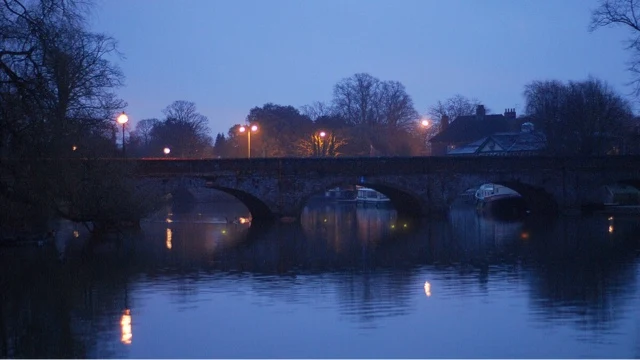In the week leading up to the 400th anniversary of Shakespeare’s (and, approximately, Cervantes’) death, I find myself immersed in theatre. Last Saturday, both Doctor Faustus and then Don Quixote – and, tomorrow (Tuesday), I will be returning to Northampton for King Lear. (This is not the place – yet; especially writing under the sobriquet The Bard of Tysoe… – for a discourse on why so much early modern literature has such ranked male titles: but it does feel extremely uncomfortable; never mind discriminatory….) Later in the week, I will also be attending the première of Immortal Shakespeare at Holy Trinity Church: music which sets “a selection of texts from Shakespeare’s plays which chart the seven ages of man: from Infant to Old Age”.
I have already seen all three of these plays: so this is not so much a critique as a brief examination of repeat viewing – something most professional critics do not get the chance to partake in; but something that I am extremely keen on (although I accept that I may be unusual in this – as in other things…).
A match made in hell
In the case of Doctor Faustus – a work whose power continues to grow even on the fifth viewing (and I still have two more to go…!) – I am taking the experiment to extremes, I know: but the play both speaks to me (and in a way no other has truly done); and features two exciting, great actors alternating two exciting, great rôles. Ironically, being hard of hearing, only those two remaining performances will be captioned – and I already know huge chunks of the text by heart. (If I have a complaint about the RSC’s access policy, it is that, quite frequently, captions will only appear – and then only twice – towards the end of a run: making my navigation through each play’s arc trickier than I feel it needs be.)
No performance has been a simple repeat, however. On Saturday – greeted with childish glee by the impish Oliver Ryan – Sandy Grierson’s match failed to light: condemning him instantly to the part of Faustus. His amused frustration, I believe, gave the responsive audience permission to laugh… – as with all great tragedy, there are quite a few moments of shoulder-shaking comedy (and vice versa). Perhaps it was simply a matter of contraposition: but the final scenes – the Helen of Troy ‘ballet’, and Faustus’ extended countdown to midnight – this time around, were almost unbearably sorrowful (even more so than what passes for usual). Ryan’s calm, moving, caesura-laced, goddess-struck rendition of Marlowe’s most famous words; and Grierson’s prolonged meditation on life and impending death, God and cursed Lucifer, heaven and plagued hell; were timed to unearthly perfection. Such silence, after that last cry of “Mephistophilis” – always unique… – longer and deeper than I think I have ever experienced at the end of any drama. And rightly so….
Gabriel Fleary (Huntsman); Amy Rockson (Emerencia); Ruth Everett (Duchess); Rosa Robson (Puppeteer) – photo by Helen Maybanks/RSC
Stockholm syndrome
With Don Quixote, the situation is reversed – and in many ways. Comedy, laced with tragedy. Sound and fury, touched with a little quietude. Understatement is not the name of the game! (I suppose the play could even be described as ‘metafiction’; or even ‘presentational theatre’. Whatever, it is very self-aware!)
Additionally, my first viewing was subtitled: and – although familiarity with the plot may also have helped here – seeing it again brought home to me that attempting to multitask (i.e. watching words and action separately/alternately) in this way actually removes you from the action quite a bit: not acting as a barrier, per se; but leading to a lesser immersion (and increased distraction). And, because Rufus Hound is playing Sancho Panza (and winning), it also meant that, previously, in sticking to the written word, we had missed out on all his boisterous ad-libbing, and the accompanying, uproarious audience involvement – which, this time round, added a deep polished layer of laughter to his portrayal (and to the whole night).
Sad, I thought – walking back through the RSC’s gardens – that this earlier – still wonderful; but not quite ‘whole’ – performance will have been most deaf people’s experience of the show: when so much extra, immersive, jollity was absent. I wonder whether the captions for King Lear will hamper or assist…?
The shadows under the trees
And in the vines by the boat-house
Grow dark,
And the lamps gleam softly.
On the street, far off,
The sound of the cars, rumbling,
Moves drowsily.
The rocks grow dim on the edges of the shore.
The boats with tired prows against the landing
Have fallen asleep heavily:
The monuments sleep
And the trees
And the smooth slow-winding empty paths sleep.









